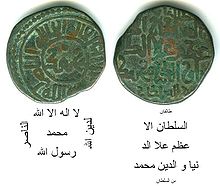Taloqan
|
تالقان Taloqan |
||
|---|---|---|
|
|
||
| Coordinates | 36 ° 44 ′ N , 69 ° 32 ′ E | |
| Basic data | ||
| Country | Afghanistan | |
| Tachar | ||
| District | Taloqan | |
| ISO 3166-2 | AF-TAK | |
| height | 876 m | |
| resident | 83,900 (2020) | |
Taloqan ( Pashto / Dari :تالقان) is the capital of Tachar Province in northern Afghanistan . According to the 1979 census, the population was 19,925. Official estimates for 2020 assume a population of 83,900.
story
The old city was described by Marco Polo in 1275 as:
“A castle called Taikhan with a large grain market and the surrounding land is good and fertile. The hills that face south are large and high. They consist entirely of white salt, extremely hard, to which people come up to a distance of 30 days' travel in order to supply themselves with it, as it is considered to be the purest salt in the world. It is so hard that it can only be broken with large iron hammers. The amount is so large that all countries in the world could be supplied with it. "
Contemporary history
Taloqan was the military headquarters of the Northern Alliance until it was captured by the Taliban on September 5, 2000 . In November 2001 the city was liberated.
The Bundeswehr maintained a smaller PAT ( Provincial Advisory Team Taloqan ) in Taloqan , which was supported by the Provincial Reconstruction Team (PRT) Kunduz .
On October 8, 2010, at least 15 people were killed in a bomb attack on a mosque in the city. The governor of the neighboring province of Kunduz , Mohammad Omar, is one of the fatalities .
On May 18, 2011, a demonstration with serious riots broke out in front of the PAT camp and in downtown Taloqan. Up to 14 demonstrators were killed and between 50 and 80 injured in the course of the demonstration. In addition, 3 German soldiers were slightly to moderately injured and 5 Afghan security forces were wounded. On June 5, 2011, a spokesman announced that the Bundeswehr is assuming a targeted attack in which German soldiers may have killed three attackers.
On May 28, 2011, seven people were killed and nine injured in a bomb attack on a security conference between a NATO delegation and Afghan officials at the headquarters of the governor of Tachar province in Taloqan. Two German soldiers were killed and six injured in the attack. Among the injured were the German ISAF commander in northern Afghanistan, General Markus Kneip and the governor Abdul Jabar Taqwa. At first, the Bundeswehr and the investigative authorities assumed a suicide bomber who had smuggled himself in with a police uniform as a bodyguard for the conference. Later reports from the National Security Directorate, however, were concerned with a remote-controlled bomb that had been hidden the days before.
At least 20 people died in a suicide attack at a funeral ceremony for a government official on December 25, 2011. Among the dead was Abdulmutalib Baig , former Kunduz police chief .
After protests against the burning of the Koran in a military prison in Bagram, there were demonstrations in Taloqan with around 300 people, during which stones were thrown at the Bundeswehr base. Therefore, the 50 Bundeswehr soldiers stationed there preferred the withdrawal planned for March and evacuated Taloqan early on February 23, 2012.
In May 2012, female pupils at a local girls' school had to be taken to hospital several times with symptoms of poisoning. The Tachar Provincial Education Authority suspected attacks and blamed the Taliban. However, they rejected the allegations.
On August 8, 2021, the Taliban captured Taloqan for the second time.
See also
Web links
- Afghanistan Ministry of Transport and Civil Aviation: Taluqan Airport
Individual evidence
- ↑ Afghanistan: Provinces & Cities. In: citypopulation.de. Retrieved August 9, 2021 .
- ^ Nancy Hatch Dupree: An Historical Guide to Afghanistan , 2nd Ed., Afghan Tourist Organization, 1977.
- ↑ Governor of Kunduz killed in attack. In: ORF . October 8, 2010, accessed October 8, 2010 .
- ^ Afghanistan: Violent demonstration in Talokan (2nd update) at bundeswehr.de, May 19, 2011
- ^ Attack on the Bundeswehr in Afghanistan - three German soldiers injured on n-tv.de, May 18, 2011
- ↑ "Violence in Talokan was controlled". In: Frankfurter Allgemeine Zeitung . June 5, 2011, accessed June 6, 2011 .
- ↑ Afghanistan: Explosives attack in Talokan at bundeswehr.de, May 28, 2011
- ↑ Attack in Afghanistan - Several Germans among the victims at n24.de, May 28, 2011
- ↑ Afghanistan: 3 German soldiers killed at bz-berlin.de, May 28, 2011
- ^ Willi Germund: Attack in Afghanistan. In: Frankfurter Rundschau . May 29, 2011, accessed May 30, 2011 .
- ↑ Steffen Hebestreit: No doubt about partnering. In: Frankfurter Rundschau. May 30, 2011, accessed May 31, 2011 .
- ↑ Several dead in an attack in Talukan. In: the daily newspaper . December 26, 2011, accessed December 27, 2011 .
- ^ Bundeswehr withdraws from Talokan. In: Frankfurter Rundschau. February 24, 2012. Retrieved February 24, 2012 .
- ^ Bundeswehr withdraws prematurely from Talokan. In: Frankfurter Allgemeine Zeitung. February 24, 2012. Retrieved February 24, 2012 .
- ↑ Family killed in NATO attack. In: Frankfurter Allgemeine Zeitung. May 27, 2012. Retrieved May 30, 2012 .
- ↑ n-tv NEWS: Third provincial capital fell in one day. Retrieved August 8, 2021 .


